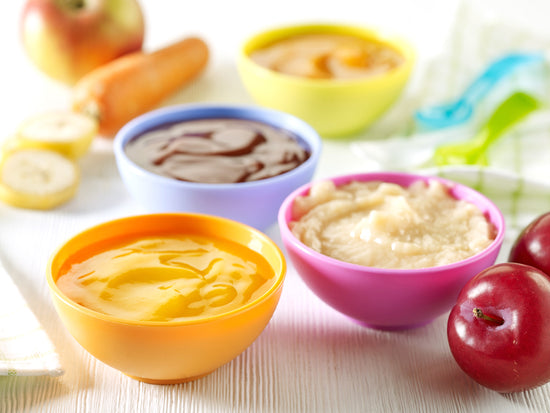Gluten Intolerance In Babies
How to Identify Gluten Intolerance in Babies?
Introducing first solid foods is an exciting milestone in your baby's development. But for some parents, this joy can be overshadowed by concerns about gluten intolerance. Identifying gluten intolerance in babies can be tricky, so here’s a guide that can help, especially if you suspect your baby might have gluten sensitivity.
Understanding Gluten Intolerance in Babies
Gluten intolerance in babies can crop up through two main conditions, namely celiac disease and an allergy to wheat.
Both of these conditions involve a reaction to gluten, which happens to be a key protein found in foods such as barley, rye and even our usual staple, wheat.
And while the two conditions are triggered by the symptom of the same ingredient, both the mechanisms and severity of symptoms are different with both.
What is celiac disease?
This is an auto-immune disease that causes damage to the small intestine when gluten in any form is consumed. While symptoms can be subtle in babies, they do include constipation or diarrhoea, along with fussiness and crankiness. Over the long term, if the intolerance goes unnoticed, Celiac disease can lead to hampered growth.
What is wheat allergy?
Just like any other allergy, a wheat allergy is simply an autoimmune response to an incompatible food item, namely gluten in our case. Wheat allergies showcase immediate symptoms such as vomiting, wheezing and hives, and hence are slightly more difficult to miss.
Signs and Symptoms of Gluten Intolerance
What are common signs and symptoms of gluten intolerance in babies?
Gluten intolerance in babies can initially be noticed through the following symptoms that appear after the consumption of foods that contain gluten.
- Repeated diarrhoea or constipation accompanied by gas and bloating.
- Slowed physical growth and lower-than-average weight gain.
- Irritability, crankiness and fussiness.
- Vomiting and restlessness after a feeding.
- Stinky and pale stools.
If you suspect that your baby is possibly gluten intolerant, based on the basic symptoms above, it is important to consult a paediatrician right away.
A formal conclusion of celiac disease or allergies can only be reached after conclusive tests. And this is essential as early diagnosis is key to better management and healthy development.
Gluten Intolerance Management
How parents can manage gluten Intolerance in babies?
Once gluten intolerance has been correctly diagnosed, you will now need to be very careful with your baby’s food. Luckily, following a gluten-free diet is not hard if you have a good understanding of foods, especially gluten-free alternatives to regular foods.
Here are some naturally gluten-free foods that are both nutritious and delicious.
-
Fruits and Vegetables: Fruits and vegetables are not only naturally gluten-free but they also provide your baby with essential vitamins, minerals, and fibre. We at Mother Nurture offer various gluten-free, healthy, delicious, Fruits Puree and Vegetable Puree for your baby.

- Quinoa: Quinoa, though not a local grain, is a protein and fibre-rich ingredient that adds nutrients, taste and texture to baby foods. We offer gluten-free healthy quinoa rich special Doodhi Delight Puree recipe for your 6 months and older child.
- Rice: Rice is a readily available and easily digestible grain that has historically been a part of baby diets in India for centuries now. Rice is not just perfect for Rice Millet Cereals but it is also versatile and can be made into healthier, tastier recipes such as Dal Khichdi.
- Corn: Corn is another excellent grain option because it is rich in carbohydrates and essential fatty acids.
- Legumes: Lentils, chickpeas, and beans are popular local legumes and they are packed with protein and fibre, perfect for introducing after your baby is over 6 months. Our Mother Nurture Mama Secret Recipe is loaded with high quality dal and green beans.
- Nut and Seed Butter: Once your baby is past the risk of choking, usually after 1 year of age, nut and seed butters (excluding peanuts) can be offered as a creamy and protein-rich addition to their diet along with regular foods. We offer cashew and almond rich Healthy Cereals for babies.
-
Millets: As the world knows by now, millets such as ragi, jowar and bajra are a powerhouse of nutrients. These millets are also naturally gluten-free and come in various varieties, textures and flavours. In India, millets like finger millet and foxtail millet have been used in baby porridges since ancient times. At Mother Nurture we offer 6 types of delicious Flavourful Millets for your 6 months and old baby.

Identifying gluten intolerance in babies can definitely be challenging, especially if the symptoms are mild. However, by being aware of the usual intolerance-related signs and symptoms, you can seek professional guidance on time.
This ensures that your baby receives a proper diagnosis and you can then start your journey to plan their healthy, gluten-free diets.
With an open mind, a little creativity and a timely diagnosis, you can keep your baby perfectly happy and nourished, despite his gluten intolerance.






